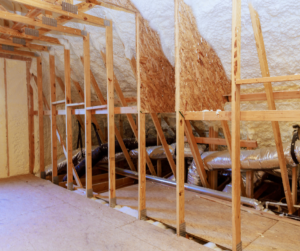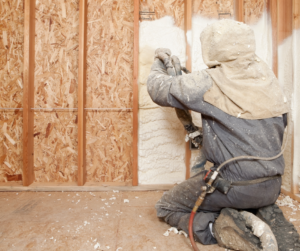Spray Foam Insulation
An alternative approach to loft insulation is to spray insulating foam directly onto the underside of the roof and between the rafters. This isn’t recommended because the roof isn’t a heated space, so this method offers little insulation benefit and can trap moisture in the rafters which can cause them to rot. The presence of spray foam insulation can affect the ability to get a mortgage on a property and once it’s applied it can be a very difficult and costly job to remove.
 Cornwall Council Trading Standards are warning local residents to be wary of scams relating to energy efficiency measures, particularly spray foam insulation. This follows an incident that occurred in Helston, where an elderly couple were told by a salesman that the Government would fine them £1,000 each year, if they didn’t make improvements to their home insulation. Although the couple have now cancelled the contract within the 14-day cooling-off period, they had already paid for the work. They have received support to secure a refund.
Cornwall Council Trading Standards are warning local residents to be wary of scams relating to energy efficiency measures, particularly spray foam insulation. This follows an incident that occurred in Helston, where an elderly couple were told by a salesman that the Government would fine them £1,000 each year, if they didn’t make improvements to their home insulation. Although the couple have now cancelled the contract within the 14-day cooling-off period, they had already paid for the work. They have received support to secure a refund.
With energy prices rising, many people are looking at ways to improve the energy efficiency of their home. Unfortunately, this has provided an opportunity for rogue installers to pressure people into agreeing to works which are unsuitable for their property.
Spray foam insulation is a technology that’s suitable in some situations, but careful advice should be sought before making a commitment. Our advice is that if you are contacted by a company offering spray foam insulation, be on your guard and contact us before signing anything or paying a deposit.

“It is important to be wary of businesses cold calling you to offer energy efficiency measures for your home. We regularly receive complaints each year about installers who claim to be working on behalf of the Government or the Council, offering grant-funded work. This case was particularly shocking, as the customers were misled into believing that they would face massive fines if they did not improve their insulation.” Gary Webster, Senior Trading Standards Officer
It is important that we all do what we can to both tackle climate change and keep our homes warm and healthy. There is financial assistance out there for homeowners who want to make these energy efficiency improvements. It is important to get the right advice, so you can avoid those rogue businesses who are simply out to make a profit.
For more in depth information, read RICS Consumer guide to Spray Foam Insulation.
Things to consider
- Be wary where you are approached following a cold call. Whilst some businesses do legitimately use these methods to find new customers, we would always recommend doing your own research, including looking at independent online reviews.
- Speak to independent advisers – we can help you work out which energy efficiency measure is best for your home, the likely cost, and what funding you may qualify for.
- When dealing with a business, make sure they tell you who they are and which source of grant funding they are intending to access. Challenge any vague statements which suggest they are ‘working for the Government’ or ‘working for the Council’.
- Genuine installers will offer a fair price for the work. Whilst they may be prepared to be negotiate a little, it is important to be suspicious if a salesperson or ‘surveyor’ offers a very large discount.
- There is no law that states that homeowners will be fined if they fail to make improvements to the energy efficiency of their home.

